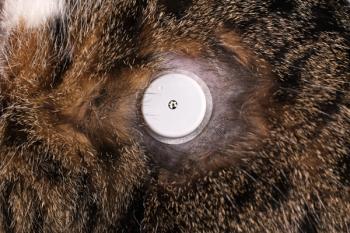
Canine infectious respiratory disease strikes Chicago
Canine influenza virus thought to be causative agent; owners encouraged to limit dogs exposure to other dogs.
More than 1,000 dogs are involved in an outbreak of canine infectious respiratory disease (CIRD) in Chicago, and veterinarians are imploring dog owners to avoid contact with other dogs until the outbreak subsides.
Ann Cohen, DVM, of the Chicago Veterinary Emergency and Specialty Center says she has seen cases of CIRD rise from one or two each week to 10 or 15 each day. She says the primary care veterinary practices the center works with are reporting similar increases.
Cohen says this is the first outbreak of its kind in the area. While a similar influx of cases occurred in 2008, it was nothing close to this magnitude.
She chalks the outbreak up in part to Chicago's strong dog culture, noting that she often sees people walking their dogs on nearly every street corner downtown. Plus, today's pet owners want their dogs to be socialized, and those working long hours look to boarding facilities and doggy day cares to fill the gap on companionship. Apartment buildings and high-rises with high volumes of dogs will also see more cases, as pet owners walk their dogs through the same common areas.
And while the canine influenza virus has been identified as a large factor in the outbreak, Cohen says it's not the only player. A variety of respiratory viruses and bacteria are popping up with shorter incubation periods, higher acuity and slower response to treatment.
“What I've noticed is they sometimes take several more days to get better and get sick faster,” Cohen says. “We haven't seen such a severe pattern before in our city, although it's pretty similar to outbreaks in other parts of the country.”
Since its discovery in 2004, 40 states have experienced canine influenza outbreaks, with 2011 being the worst on record with 17 states reporting outbreaks that year alone.
The Cook County Department of Animal and Rabies Control (CCDARC) issued a warning to dog owners last week that more than 1,013 cases of canine infectious respiratory disease (CIRD) had been identified through voluntary reporting since January, including five deaths. But CIRD does not need to be reported, and there could be more cases, the agency says. The CCDARC expects the outbreak to last several more weeks.
The ages of dogs affected by the outbreak vary, but the worst cases have been seen in dogs younger than 1 year or older than age 7. Symptoms include persistent and lingering cough, lethargy, poor appetite and high fever. CCDARC recommends taking any animals suspected to have CIRD be seen by their veterinarian, and stresses that CIRD is highly contagious and avoiding pet friendly locations like dog parks and boarding facilities is key to containing the outbreak. Dogs can be contagious even if they aren't displaying any symptoms, warns CCDARC Director Donna Alexander, DVM.
While CIRD can't be transmitting to humans or other household pets such as cats, humans can spread the disease from dog to dog and the virus can live on fabrics for 24 hours and hard surfaces for 48 hours, Alexander says.
Ninety-three percent of the samples submitted for testing by area veterinarians have tested positive for canine influenza, and data suggests that influenza virus is the causative agent in the uptick of CIRD cases, Alexander says. The University of Illinois concurred in its statement about the outbreak, stating that canine influenza was identified in a few of the cases submitted to the Animal Health Diagnostic Center at Cornell University, one of the few veterinary diagnostic laboratories that offer a canine respiratory panel identifying common viruses and bacteria associated with kennel cough.
A number of samples are still being tested, but the university says early data indicate that the outbreak may be due to a collection of respiratory viruses rather than any new strains. The outbreak is likely caused by a host of viral culprits, according to the university, including canine distemper virus, canine adenovirus, canine parainfluenza virus, and the more recent canine influenza virus.
Brendan McKiernan, DVM, DACVIM, director of the University of Illinois Veterinary Teaching Hospital in Urbana and an expert in respiratory diseases of dogs and cats, is advising pet owners whose dogs have contact with others to give their pets the canine influenza vaccine, at least until the outbreak is over.
“Avoidance of exposure is the name of the game for now,” he says. “Even if you vaccinate, the vaccines are protective only after the booster, injected three to four weeks after the initial vaccination. We also won't know for a while whether this is the same canine influenza virus that is in the vaccine, or if it is a mutation of that virus. Lastly, remember that no vaccine can be 100 percent protective.”
While vaccines might not prevent all cases, they can minimize the severity of the disease, McKiernan adds.
When the canine influenza is exacerbated or coupled with other respiratory diseases, dogs can progress to pneumonia, and some veterinarians around Chicago have reported dogs requiring ventilation or supplemental oxygenation.
Some Chicago-area facilities catering to canine customers are closing or advising dog owners to stay away in an effort to stem the outbreak, including PetSmart, which closed three of its Chicago-area PetsHotels. Pet owners who had pets boarded in the South Loop, Lincoln Park and Evanston locations were contacted to try pick them up, and any pets showing symptoms of infection were isolated and will be monitored around the clock by PetsHotel staff.
“Because of the highly contagious nature of canine influenza, we have made the decision to proactively close these three PetsHotels out of an abundance of caution,” says Robyn Jaynes, DVM, a veterinarian and director of services quality assurance for PetSmart. “The key to minimizing the spread of this virus is isolating and treating pets that are showing symptoms, while limiting the exposure of healthy pets to other dogs.”
The Lincoln Park location was emptied first and closed for 48 hours for disinfection. It reopened April 5. The remaining two hotels are waiting for the facilities to empty and will not be accepting any more pets so they can repeat the same protocol.
Newsletter
From exam room tips to practice management insights, get trusted veterinary news delivered straight to your inbox—subscribe to dvm360.




